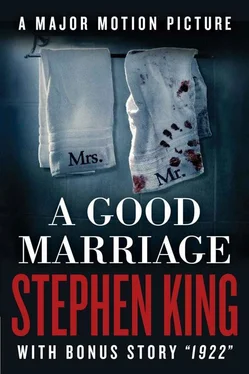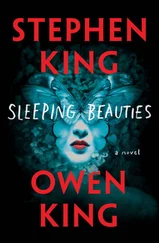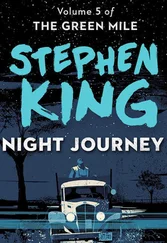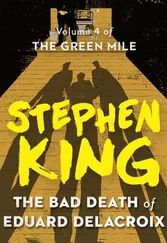We argued bitterly over that 100 acres during the winter and spring of 1922. Henry was caught in the middle, yet tended more to my side; he favored his mother in looks but me in his love for the land. He was a biddable lad with none of his mother’s arrogance. Again and again he told her that he had no desire to live in Omaha or any city, and would go only if she and I came to an agreement, which we never could.
I thought of going to Law, feeling sure that, as the Husband in the matter, any court in the land would uphold my right to decide the use and purpose of that land. Yet something held me back. ’Twas not fear of the neighbors’ chatter, I had no care for country gossip; ’twas something else. I had come to hate her, you see. I had come to wish her dead, and that was what held me back.
I believe that there is another man inside of every man, a stranger, a Conniving Man. And I believe that by March of 1922, when the Hemingford County skies were white and every field was a snow-scrimmed mudsuck, the Conniving Man inside Farmer Wilfred James had already passed judgment on my wife and decided her fate. ’Twas justice of the black-cap variety, too. The Bible says that an ungrateful child is like a serpent’s tooth, but a nagging and ungrateful Wife is ever so much sharper than that.
I am not a monster; I tried to save her from the Conniving Man. I told her that if we could not agree, she should go to her mother’s in Lincoln, which is sixty miles west—a good distance for a separation which is not quite a divorce yet signifies a dissolving of the marital corporation.
“And leave you my father’s land, I suppose?” she asked, and tossed her head. How I had come to hate that pert head-toss, so like that of an ill-trained pony, and the little sniff which always accompanied it. “That will never happen, Wilf.”
I told her that I would buy the land from her, if she insisted. It would have to be over a period of time—eight years, perhaps ten—but I would pay her every cent.
“A little money coming in is worse than none,” she replied (with another sniff and head-toss). “This is something every woman knows. The Farrington Company will pay all at once, and their idea of top dollar is apt to be far more generous than yours. And I will never live in Lincoln. ’Tis not a city but only a village with more churches than houses.”
Do you see my situation? Do you not understand the “spot” she put me in? Can I not count on at least a little of your sympathy? No? Then hear this.
In early April of that year—eight years to this very day, for all I know—she came to me all bright and shining. She had spent most of the day at the “beauty salon” in McCook, and her hair hung around her cheeks in fat curls that reminded me of the toilet-rolls one finds in hotels and inns. She said she’d had an idea. It was that we should sell the 100 acres and the farm to the Farrington combine. She believed they would buy it all just to get her father’s piece, which was near the railway line (and she was probably right).
“Then,” said this saucy vixen, “we can split the money, divorce, and start new lives apart from each other. We both know that’s what you want.” As if she didn’t.
“Ah,” I said (as if giving the idea serious consideration). “And with which of us does the boy go?”
“Me, of course,” she said, wide-eyed. “A boy of 14 needs to be with his mother.”
I began to “work on” Henry that very day, telling him his mother’s latest plan. We were sitting in the hay-mow. I wore my saddest face and spoke in my saddest voice, painting a picture of what his life would be like if his mother was allowed to carry through with this plan: how he would have neither farm nor father, how he would find himself in a much bigger school, all his friends (most since babyhood) left behind, how, once in that new school, he would have to fight for a place among strangers who would laugh at him and call him a country bumpkin. On the other hand, I said, if we could hold onto all the acreage, I was convinced we could pay off our note at the bank by 1925 and live happily debt-free, breathing sweet air instead of watching pig-guts float down our previously clear stream from sun-up to sun-down. “Now what is it you want?” I asked after drawing this picture in as much detail as I could manage.
“To stay here with you, Poppa,” he said. Tears were streaming down his cheeks. “Why does she have to be such a… such a…”
“Go on,” I said. “The truth is never cussing, Son.”
“Such a bitch !”
“Because most women are,” I said. “It’s an ineradicable part of their natures. The question is what we’re going to do about it.”
But the Conniving Man inside had already thought of the old well behind the cow barn, the one we only used for slop-water because it was so shallow and murky—only 20 feet deep and little more than a sluice. It was just a question of bringing him to it. And I had to, surely you see that; I could kill my wife but must save my lovely son. To what purpose the ownership of 180 acres—or a thousand—if you have no one to share them with and pass them on to?
I pretended to be considering Arlette’s mad plan to see good cornland turned into a hog-butchery. I asked her to give me time to get used to the idea. She assented. And during the next 2 months I worked on Henry, getting him used to a very different idea. ’Twasn’t as hard as it might have been; he had his mother’s looks (a woman’s looks are the honey, you know, that lure men on to the stinging hive) but not her God-awful stubbornness. It was only necessary to paint a picture of what his life would be like in Omaha or St. Louis. I raised the possibility that even those two overcrowded antheaps might not satisfy her; she might decide only Chicago would do. “Then,” I said, “you might find yourself going to high school with black niggers.”
He grew cold toward his mother; after a few efforts—all clumsy, all rebuffed—to regain his affections, she returned the chill. I (or rather the Conniving Man) rejoiced at this. In early June I told her that, after great consideration, I had decided I would never allow her to sell those 100 acres without a fight; that I would send us all to beggary and ruin if that was what it took.
She was calm. She decided to take legal advice of her own (for the Law, as we know, will befriend whomever pays it). This I foresaw. And smiled at it! Because she couldn’t pay for such advice. By then I was holding tight to what little cash money we had. Henry even turned his pig-bank over to me when I asked, so she couldn’t steal from that source, paltry as it was. She went, of course, to the Farrington Company offices in Deland, feeling quite sure (as was I) that they who had so much to gain would stand good her legal fees.
“They will, and she’ll win,” I told Henry from what had become our usual place of conversation in the hay-mow. I was not entirely sure of this, but I had already taken my decision, which I will not go so far as to call “a plan.”
“But Poppa, that’s not fair!” he cried. Sitting there in the hay, he looked very young, more like 10 than 14.
“Life never is,” I said. “Sometimes the only thing to do is to take the thing that you must have. Even if someone gets hurt.” I paused, gauging his face. “Even if someone dies.”
He went white. “Poppa!”
“If she was gone,” I said, “everything would be the way it was. All the arguments would cease. We could live here peacefully. I’ve offered her everything I can to make her go, and she won’t. There’s only one other thing I can do. That we can do.”
“But I love her!”
“I love her, too,” I said. Which, however little you might believe it, was true. The hate I felt toward her in that year of 1922 was greater than a man can feel for any woman unless love is a part of it. And, bitter and willful though she was, Arlette was a warm-natured woman. Our “marital relations” had never ceased, although since the arguments about the 100 acres had begun, our grapplings in the dark had become more and more like animals rutting.
Читать дальше











